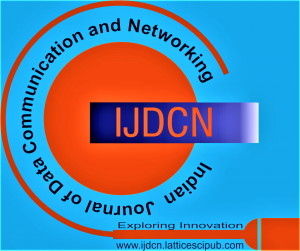![]()
Energy Efficient Multihop Cooperative Transmission Protocol for Large Scale Mobile Adhoc Networks
D. Praveen Kumar1, P. Pardha Saradhi2, M. Sushanth Babu3
1D. Praveen Kumar, Koneru Lakshmaiah Education Foundation Vardhaman College of Engineering, Hyderabad, Telangana, India.
2P. Pardha Saradhi, Koneru Lakshmaiah Education Foundation Green Fields, Vaddeswaram Guntur (Dist.), Andhra Pradesh. India.
3M. Sushanth Babu, Matrusri Engineering College Sayeedabad, New Malakpet, Hyderabad, Telangana.
Manuscript received on 05 November 2020 | Revised Manuscript received on 19 November 2020 | Manuscript Accepted on 15 December 2020 | Manuscript published on 30 December 2020 | PP: 9-18 | Volume-1 Issue-1, December 2020 | Retrieval Number: 100.1/ijdcn.A1008121120
Open Access | Ethics and Policies | Indexing and Abstracting
© The Authors. Published by Lattice Science Publication (LSP). This is an open access article under the CC-BY-NC-ND license (http://creativecommons.org/licenses/by-nc-nd/4.0/)
Abstract: Cooperative Communication (CC) is implemented extensively in mobile Ad hoc networks to leverage the benefits of CC technique. Energy consumption and routing are major challenges for large scale Cooperative Mobile Ad hoc Networks (LC-MANET) since each node in the network have mobility. To address these challenges, a hybrid multi-hop cooperative routing algorithm is formulated by combining clustering and location-based routing strategies. The main idea of our algorithm is to establish communication between similar mobility nodes to reduce the mobility effect since the link between (approximately) equal mobility nodes was reliable. All the equal mobility nodes are grouped to form a cluster; one of the nodes in this is selected as a cluster head based on its location. Further, we optimize the number of transmitters and receivers in every hop; and an optimal number of cooperative relays are obtained in every hop thereby reducing the end-to-end energy utilization. The evaluation result shows that the proposed algorithm saves energy consumption by up to 53.42% compared to traditional algorithms.
Keywords: Energy-efficient routing, large-scale MANET, relay selection, energy optimization, cooperative routing, clustering.
